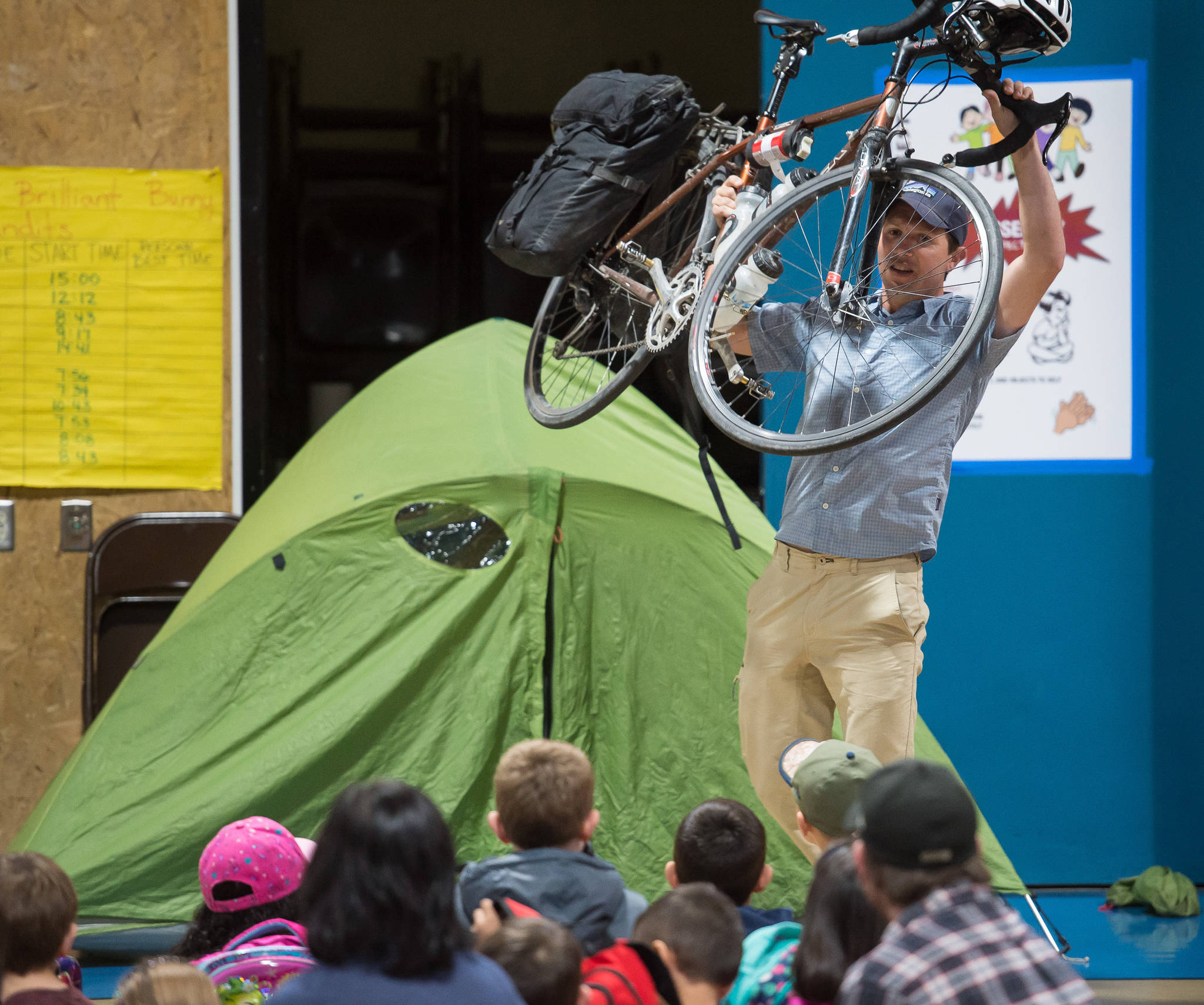With nothing but a tent, a bike, some carbon fiber cycling cleats and about 25 pounds of gear, Chris Figureida is cycling from the northern tip of Alaska to the southern tip of California this fall. By the end, he’ll cover nearly 4,000 miles.
Over the past decade, Figureida has cycled nearly 40,000 miles with a message: if kids don’t start moving, lessen their screen time and get outside, obesity and related medical issues could make America’s youngest generation the first to not outlive their parents.
Figureida took a break from his ride to speak with students at a Mendenhall River Community School assembly last Friday. Eyes wide and arms outstretched, Figureida — Mr. Chris to the kids — held his audience rapt. He knows how to keep a first grader’s attention. He’s spoken to 67,000 students during his adventures.
“The first thing I want everyone here to do is make a fist,” Figureida emplored the assembly. “Awesome. Now, for as long and as hard as everyone can possibly squeeze, I want to see everyone flex those bicep muscles, squeeze, squeeze, squeeze, and release.”
The bicep is a muscle just like the heart, he explained. It needs to be used to stay in shape and it needs to be fed properly. His recommendation: drink only water or milk and get 60 minutes of exercise a day, two things U.S. Department of Health and Social Services recommends.
Unfortunately, like most of the rest of the nation, Alaska students aren’t living up to those recommendations. According to a 2015 study, only 21 percent of Alaska students currently get 60 minutes of exercise a day.
Figureida is a professional cyclist, but instead of competing in the Tour de France or a professional BMX circuit, he raises awareness and funding for the American Heart Association.
His work has taken him all over the world. He’s biked across Africa and from the lowest point in North America in Death Valley, California, to the highest point at the top of Mount Denali. Figureida is also an accomplished mountaineer; on the Denali trip, he parked his bike at the base of America’s tallest mountain, climbed to the top, then back down. And then, just because he said doing anything else, Figureida decided to bike back to Death Valley to complete the loop.
Cycling long distances feeds Figureida’s adventurous spirit, but it’s also a fitting “gimmick” he uses to get his message out. He says if he could make a difference rollerblading a long distance, he would. He doesn’t do it for bragging rights; the important part is getting the word out on an issue he says is of grave importance.
“In 2006, there was a Harvard study that showed that this generation of children will be the first generation of children not to outlive their parents, and that study is still true today even though it’s 11 years later,” Figureida said.
Right now, about one in three Alaska students are overweight or obese, according to Wendy Hamilton, an official with the Alaska Division of Public Health. Healthy students also do better academically.
“The terms and costs are staggering, not just in dollars in health care, but also in the lives. These diseases don’t just affect one person, they affect entire families economically and socially,” Figureida said. “My goal is to come out here and affect that.”
Figureida will need about 5,000 calories a day to put in his 75 daily miles. He gleefully told the kids at MRCS that he can eat a pint of ice cream a day and still lose about a pound of body weight a week during his trip. But, unless they are also cycling thousands of miles in a few months, that’s not a healthy option for them.
Figureida keeps a live blog that tracks his journey through GPS at http://www.cycleforheart.org/. Followers can send him messages and encouragement during his ride.
• Contact reporter Kevin Gullufsen at 523-2228 or kevin.gullufsen@juneauempire.com.

